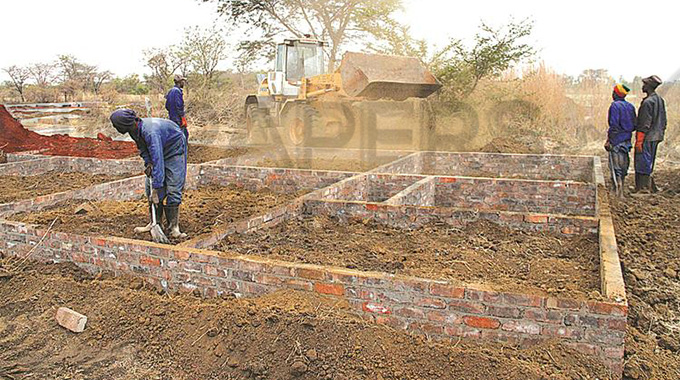Source: Govt rolls out 200 000 houses | The Herald
Construction workers busy at KockMallock estate in Norton on Friday where the development of 2 200 stands is underway Blessings Chidakwa Municipal Correspondent
The rolling out of up to 200 000 affordable houses by Government in partnership with the private sector has started in Norton with the development of 2 200 stands on KockMallock estate.Roads are now being tarred and sewer pipes laid, while the foundations of the first batch of three-bedroomed houses are under construction.
Government plans to construct all the 200 000 planned houses and flats by 2023, with land for development being identified across Zimbabwe.
Shelter Afrique, a Pan-African bank, has put a facility of US$65 million to fund housing through building societies and the Urban Development Corporation (Udcorp).
Presently, Udcorp is working on getting the contractors back to the Norton suburb after delays arising from the lockdown.
In an interview yesterday, National Housing and Social Amenities Minister Daniel Garwe said the building of the houses was in line with Vison 2030 of attaining an upper middle income society, and efforts to revamp national infrastructure. There was also a constitutional right that everyone should have a roof above their heads.
“We are aware of the housing backlog through the waiting lists with local authorities. The housing backlog is two million with the effective demand for housing being about 1.5 million,” he said.
The gap between the backlog defined by waiting lists and that defined by the estimate actual demand arises from those putting down their names on more than one list, those who want to move to a better house, and those who are on a list but who will never be able to have their home for several reasons.
“We need houses that are affordable in terms of rents, procurement and in terms of rent-to-buy. We want to provide social housing to Zimbabweans and we have covered a lot of ground in preparation and we have spoken to the private sector as well.”
But Minister Garwe said not everyone will have own housing, making rented accommodation the way to go as land was a finite resource.
He said while Udcorp has funding from Treasury, the private sector has been asked to join Government in providing housing to Zimbabweans.
“Government does not have all the money that is required to ensure these programmes become a success. But it has got land and we have said to the private sector, ‘why don’t you bring your financial resources and we will avail the land?’” he said.
Minister Garwe said the focus was now on urban to rural migration.
There are two critical departments, the urban department that deals with the smart city concepts, urban houses and peri-urban housing as well as the department of rural housing, which will deal effectively in ensuring there are modern houses built in all rural district councils.
Farmers will also be engaged so that modern houses are constructed in farming and rural communities.
Government will also provide septic tanks and boreholes, together with renewable energy and wi-fi to catch up with the technological advancements.
“ICT is now an integral part of our day-to-day lives. With Covid-19 upon us all the business is now being run online, which makes wi-fi an important component very critical in our deliverables,” said Minister Garwe.
Apart from providing, Government also wants to create industrial hubs in growth centres.
Financial institutions such as POSB, CABS and FBC have also come on board.
Pilot projects are set for Goromonzi and Murewa.
Minister Garwe said 20 flats would be put up in Goromonzi and another 20 flats in Melfort.
“We are looking at developing rural district councils by building shopping malls there. We have held several meetings with pension funds, the corporate world, members of the regional community and Pan-African banks.
“They have agreed to come on board. We are in the process of developing construction models like build, operate and transfer, as well as public-private partnerships.”
Older Post
Midlands recommends Gumbo readmission 
COMMENTS
Another looting alley way/avenue opened!!